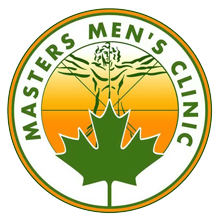The Importance of Testosterone
Simply being alive and living out a normal day causes some damage to the body.
Testosterone, along with growth hormone, is necessary so that the body can repair itself!
Testosterone is a hormone that has an effect on almost every aspect of a man’s body. Testosterone helps the body to build the various proteins that play key roles in virtually every bodily function. Testosterone is produced in the testes and in the adrenal glands. It is to males what estrogen is to females.

Starting at about age 30, testosterone levels drop by about 10 percent every decade. At the same time, another factor in the body called Sex Binding Hormone Globulin, or SHBG, is increasing. SHBG traps much of the testosterone that is still circulating and makes it unavailable to exert its effects in the body’s tissues. What’s left over does the beneficial work and is known as ‘bioavailable’ testosterone.
Andropause is associated with low (“bioavailable”) testosterone levels. Every man experiences a decline of bioavailable testosterone but some men’s levels dip lower than others. And when this happens these men can experience Andropausal symptoms.

Testosterone is essential for normal sexual behavior and giving rise to erections. It also affects many metabolic activities such as production of blood cells in the bone marrow, bone formation, cholesterol metabolism, carbohydrate metabolism, liver function and prostate gland growth. It also affects mood.
These symptoms can impact their quality of life and may expose them to other, longer-term risks of low testosterone. It is estimated that 30% of men in their 50s will have testosterone levels low enough to be causing symptoms.
The Importance of Testosterone
Simply being alive and living out a normal day causes some damage to the body.
Testosterone, along with growth hormone, is necessary so that the body can repair itself!
Testosterone is a hormone that has an effect on almost every aspect of a man’s body. Testosterone helps the body to build the various proteins that play key roles in virtually every bodily function. Testosterone is produced in the testes and in the adrenal glands. It is to males what estrogen is to females.
Starting at about age 30, testosterone levels drop by about 10 percent every decade. At the same time, another factor in the body called Sex Binding Hormone Globulin, or SHBG, is increasing. SHBG traps much of the testosterone that is still circulating and makes it unavailable to exert its effects in the body’s tissues. What’s left over does the beneficial work and is known as ‘bioavailable’ testosterone.
Andropause is associated with low (“bioavailable”) testosterone levels. Every man experiences a decline of bioavailable testosterone but some men’s levels dip lower than others. And when this happens these men can experience Andropausal symptoms.
Testosterone is essential for normal sexual behavior and giving rise to erections. It also affects many metabolic activities such as production of blood cells in the bone marrow, bone formation, cholesterol metabolism, carbohydrate metabolism, liver function and prostate gland growth. It also affects mood.
These symptoms can impact their quality of life and may expose them to other, longer-term risks of low testosterone. It is estimated that 30% of men in their 50s will have testosterone levels low enough to be causing symptoms.
Impact of Low Testosterone
Most parts of the body need testosterone to function optimally. Without enough active testosterone, many changes can occur throughout the body.
Among healthy men, there is a substantial variability in testosterone levels and so not all men will experience the same changes to the same extent.
Typical responses to low bioavailable testosterone levels include:
- Excessive fatigue
- Reduced interest in sex
- Emotional, psychological and behavioural changes
- Decreased muscle mass
- Loss of muscle strength
- Increased body fat
- Weak bones/back pain or osteoporosis
- Generalized aches and pains
- Forgetfulness
- Cardiovascular risks (See Below)
- Sleep disturbances
Cardiovascular risks *
It is now well accepted that women’s risk of atherosclerosis (hardening of the arteries) increases after menopause. Estrogen replacement therapy seems to reverse this trend. New evidence suggests that a similar phenomenon occurs in men as their testosterone levels diminish with age. While research is not as complete as for women, the clinical findings point to an association between low testosterone levels and an increase in cardiovascular risk factors in men.
* A cause and effect relationship has not yet been established in large clinical trials. The current clinical work does support further research into this important area.







